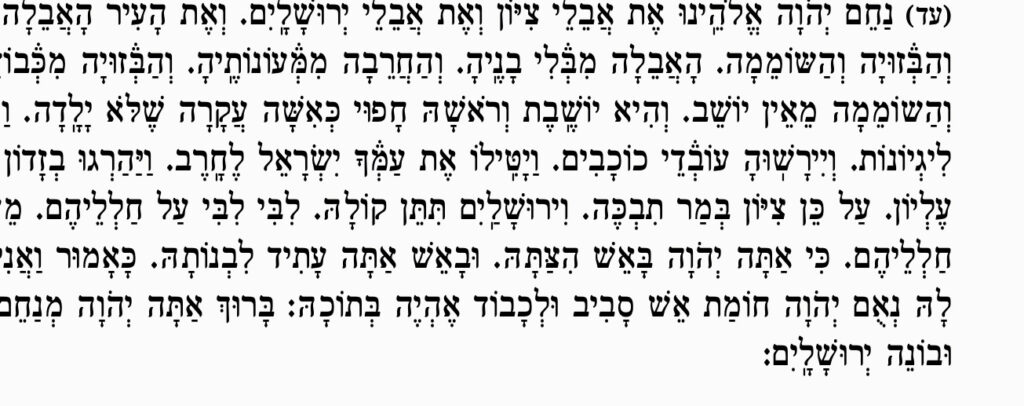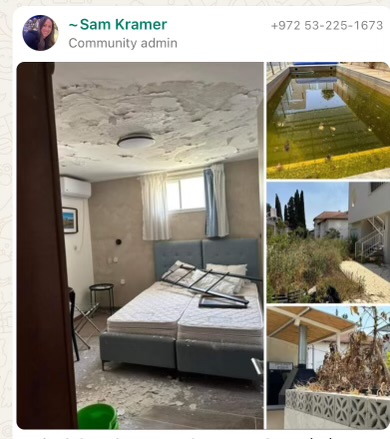One of the most inspiring chats that I’m on is the Israel Good News Chat which shares only good news out of Israel during the war. As I was sitting on Tisha B’Av, contemplating the destruction of the Beis HaMikdash, I recalled a post that I would like to share from Aryeh Akerman, a resident of Israel’s northern town of Kiryat Shmona. On the chat he shared photos of his abandoned home. The gutters, which no one opened during a rainy winter, created moisture that destroyed the ceiling of the first floor. The pool turned into a swamp. Thorns up to a meter high replaced the well-kept garden. The scum and abandonment joined also a street cat that replaced the fox in a scene that seemed to be taken from the story of the destruction of the Temple…
It occurred to me that people today are quite literally seeing destruction and devastation. I recalled my trip to Israel. Seeing the home in Sderot where the rockets had landed, then abandoned because the owner had to flee. And worst of all, standing in the street of the young marrieds in Kfar Azza, seeing the absolute Churban, bullet holes, fires, carnage wrought against the most innocent and wonderful people.
And then I thought to myself this is exactly what it means to mourn something. It’s when you can recall the life that existed in these places. The young couple who discussed their future, the child’s crib, the balls, the workspace, the Shabbat afternoon walks. How all of that is now gone. we mourn that loss.
That, my friends, is Tisha B’Av. But today is not Tisha B’Av. Today is Shabbos Nachamu. The Shabbos of consolation, named for the ancient words of the Prophet Isaiah with which the Haftarah opens. But how do you get there? How do we unlock consolation? How do we achieve nechama? How do we go from despair of Aryeh Ackemran’s house or that street in Kfar Azza- to the optimism and hope of a Shabbos Nachamu?
I believe the answer lies in the annual prayer we recite on Tisha B’AV afternoon- call Nacheim. It is a plea to G-d to comfort us, mourners of Zion and Jerusalem. And the truth is for many years I have been perplexed by that prayer. It is very heavy on the sadness and very lean on the consolation. The prayer begins by depicting a forlorn Jerusalem. Listen to the words:

While this is a very emotional and heart wrenching description of the anguish of Jerusalem- there seems to be very little in the way of comfort in this piece of liturgy? What exactly are we praying for?
The answer must lie that very last line. Because Jerusalem was burned with fire and will be built with a heavenly fire. What this means I believe is the following concept. IN selichos we say the following about G-d. “Mimaka Atzmah Mitaken Retiyah” From the wound itself G-d makes the bandage. This is very profound. It doesn’t simply mean that it will all one day work out well. That somehow its all for the best. But it means that somehow, someway, the pain will be the source of the redemption! Jerusalem was burned with fire but will one day be built with fire.
Think about it- how many mitzvos do we have in the Torah as a result of Yetzias Mitrayim? Hundreds. Those are products of pain and anguish. Think how many mitzvos we have as a result of the destruction of the Temple- hundreds! Think about how the Holocaust created an entirely new reality. Eretz Yisrael. An unparalleled flourish of Torah. “Mimaka Atzmah Mitaken Retiyah”- We have seen with our own eyes, how HaShem has taken a wound and transformed it into a salve.
R Yerucham Levovitz in the early part of the 20th century wrote a letter about a decree against Shechita in Poland. And he said at first he felt this was a terrible decree. TO the point that he felt physically ill over it. But then he said he took a retake. he said you know what- this is really a sign of greatness. We look back at the Jews who gave up their lives during the Spanish Inquisition with greatness! Were jealous of these people who had so much courage. They were heroes. Of course it wasn’t easy when they went through it but it was a great accomplishment. The fact that the have to undergo all of these trial and tribulations throughout these generations that one small little nation is being hounded by the while world- that testifies to our greatness. Tests are a time to be proud. G-d chose me. He thinks we can reach greatness. He says: Trichim Anu LHargish Geut Rabbah Ki Notnim lAnu Nisyonot Gedolot KaEilah. VZeh Tifaretinu Vadai.
And this is true not only on a global level, not only on a Klala Yisrael level, but whatever challenge a person goes through- they have to somehow try and see how that challenge will become a source of growth for them. And don’t get me wrong. In the midst of a challenge it can be terribly painfully hard to see. But that we bear in mind this concept that HaShem will fashion the bandage out of the wound itself. That the same fire that destroyed Jerusalem will ultimately rebuild it. That whatever issue we have will somehow be a constructive, I daresay, redemptive part of our future- is the essence of what Shabbos Nachamu is all about.
Allow me to share the end of Aryeh Ackermans story. As they looked in horror at teh ruins of their home in Kiryat Shmona they were enveloped in terrible silence. Silence so thick you could cut it with a knife.
The deafening silence, was interrupted by a WhatsApp voice message from a 17-year-old boy, my beautiful son, who had just been in the Kinneret with friends who were looking together with him at the photos I sent:
‘Father, my friends said that they would come for a few days to help us. We will paint, plant, clean the pool, and replaster the ceiling. All they want in return is that you make sure that there is something to put on the barbecue in the evening, and if necessary I will bring more guys from Alb”sh (the Aloni HaBashan Yeshiva)’.
I sat down for a moment to get excited. From this boy, from his friends, from his teachers… from Rabbi Ran, the head of the yeshiva, who told us before the 9th grade that his mission is to make these boys look in the mirror and like what they see. And now they seemed indefatigable in their mission to rebuild our Jewish home in our Jewish state. Through the images of destruction, they saw the beauty of redemption. The very home that was now disheveled would soon shine bright with joy and radiance.
So, I thought that amidst all the tragedy this is all our Father in Heaven so badly wants to hear from us:” Don’t worry, Father, me and my friends will build your house back, you just make sure there is something to put on the altar…’.
And for one small moment, I watched that street cat that replaced the fox that came out of the destroyed temple, I felt deep in my heart the optimism of Rabbi Akiva. And in these moments, the most difficult, please also remember that *we are the generation of redemption. * And HaShem, our father, don’t worry, we’ll build Your house back.”

